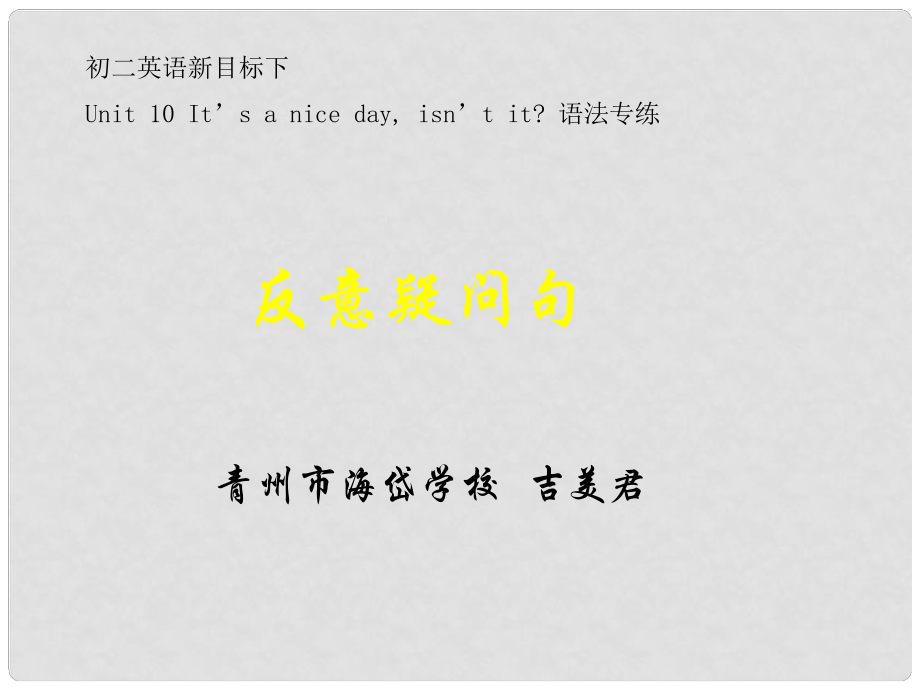《八年級(jí)英語(yǔ)下Unit 10 It’s a nice day, isn’t it 語(yǔ)法反意疑問(wèn)句課件新目標(biāo)》由會(huì)員分享��,可在線閱讀�����,更多相關(guān)《八年級(jí)英語(yǔ)下Unit 10 It’s a nice day, isn’t it 語(yǔ)法反意疑問(wèn)句課件新目標(biāo)(13頁(yè)珍藏版)》請(qǐng)?jiān)谘b配圖網(wǎng)上搜索����。
1、反意疑問(wèn)句初二英語(yǔ)新目標(biāo)下Unit 10 Its a nice day, isnt it? 語(yǔ)法專(zhuān)練青州市海岱學(xué)校 吉美君反意疑問(wèn)句1�����、構(gòu)成:��、構(gòu)成:陳述句�,簡(jiǎn)單問(wèn)句陳述句,簡(jiǎn)單問(wèn)句2�����、原則:�����、原則:It is a nice day, isnt it? 3�����、關(guān)于答語(yǔ)�����,只要事實(shí)是肯定的�,就用關(guān)于答語(yǔ),只要事實(shí)是肯定的�����,就用yes,只要�����,只要事實(shí)是否定的�����,就用事實(shí)是否定的����,就用no來(lái)回答來(lái)回答.He is a good boy,isnt he ? 前肯后否;前否后肯前肯后否���;前否后肯It isnt a nice day, is it? Yes, he is./No, he isnt. You di
2���、dnt go to school yesterday, did you?Yes, he did./ No, he didnt. 1.1.陳述部分是陳述部分是I am I am 或或 Im Im 時(shí),疑問(wèn)部分用時(shí)��,疑問(wèn)部分用 arent I.arent I. 2.陳述句部分是“There be”句型時(shí),附加問(wèn)句部分常用be there�����。There are some books on the desk,arent there?There will be a football match this afternoon, wont there ? There will no schools in th
3、e future, will there?I am a teacher, arent I? He hardly knows you, does he? You have never been to Shanghai, have you? There is little water in the cup, is there? They have never seen the film, have they? �����?3.陳述部分如果含有hardly, never, few, little,no, nothing ,seldom等否定詞時(shí)�����,附加問(wèn)句用肯定式. Thats unfair, isnt it?
4�����、 They dislike English, dont they? You are too careless, arent you? He looks unhappy today, doesnt he ? 5 5. .陳述部分主語(yǔ)是陳述部分主語(yǔ)是everyone, everybody, everyone, everybody, someone,somebody, anybody, no one, nobodysomeone,somebody, anybody, no one, nobody等表示等表示人的不定代詞時(shí)�,疑問(wèn)部分主語(yǔ)用人的不定代詞時(shí)���,疑問(wèn)部分主語(yǔ)用they, hethey, he�����;
5�����、Everyone is here, isnt he ?/Arent they?Nobody knows the answer, does he ?/Do they? Nothing is impossible, is it? Everything is ready, isnt it? Please come to the blackboard, will you? /Wont you? Dont play football in the street, will you? Lets go fishing, shall we? /shant we? Let us watch Tv for a w
6�、hile, will you?7.祈使句的反意疑問(wèn)句祈使句的反意疑問(wèn)句WILL YOU, 或或 SHALL WE 8. 8.陳述句部分是陳述句部分是 主從復(fù)合句主從復(fù)合句 時(shí),附加問(wèn)句部分的主語(yǔ)和時(shí)�����,附加問(wèn)句部分的主語(yǔ)和謂語(yǔ)動(dòng)詞形式應(yīng)該與主句的主語(yǔ)和謂語(yǔ)動(dòng)詞形式保持一致���。謂語(yǔ)動(dòng)詞形式應(yīng)該與主句的主語(yǔ)和謂語(yǔ)動(dòng)詞形式保持一致�����。He said he would go to Dalian, didnt he ?He thinks its a wrong answer , doesnt he? 9.陳述句部分的主語(yǔ)如果是I /We, 謂語(yǔ)動(dòng)詞是think, believe時(shí)�,附加問(wèn)句的主語(yǔ)和謂語(yǔ)動(dòng)詞形式
7�、應(yīng)與從句中的主語(yǔ)和謂語(yǔ)動(dòng)詞形式保持一致,而其肯定否定式則與主句相反���。I believe you will pass the exam, wont you?I dont think she can come here on time, can she?1. I am on duty,_?2. Your mother is a doctor ,_?3. The weather here is very hot ,_?4. Thats a Japanese car ,_?5. Miss Gao teaches English ,_?6. She doesnt like apples ,_?7. To
8����、m had supper yesterday ,_?8. She had to get there early ,_?9. Mary cant ride a bike ,_?10. There is some milk in the glass ,_?arent I isnt sheisnt itisnt itdoesnt shedoes shedidnt hedidnt shecan sheisnt there11. There will be no rain tomorrow ,_?12. My father never went to Xian ,_?13. Nothing can st
9��、op him learning English ,_?14. Something is wrong with your computer ,_?15. everyone is here ,_?16. Dont be late for class ,_?17. Lets go to the cinema ,_?18. Let us go out for a walk ,_?will theredid hecan itisnt itisnt hewill youshall wewill you19. I dont think she will come here ,_?20. I think it rained last night ,_?21. He thinks its a wrong answer ,_?22. The girl was unhappy yesterday ,_?23. You must study hard ,_?24.Doing morning exercises is good for you ,_?25. John is reading books ,_?will shedidnt itdoesnt hewasnt shemustnt youisnt itisnt he
 八年級(jí)英語(yǔ)下Unit 10 It’s a nice day, isn’t it 語(yǔ)法反意疑問(wèn)句課件新目標(biāo)
八年級(jí)英語(yǔ)下Unit 10 It’s a nice day, isn’t it 語(yǔ)法反意疑問(wèn)句課件新目標(biāo)

